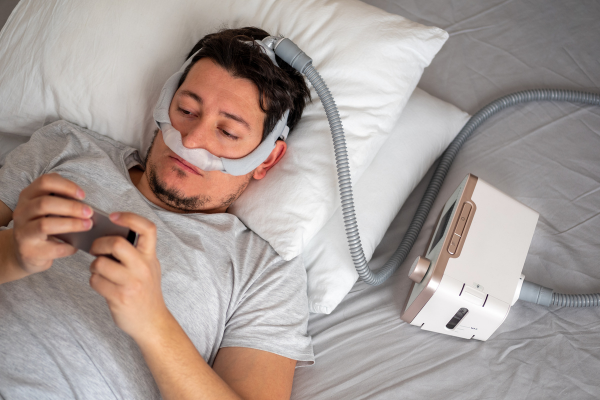When you hear the word “magnesium,” you probably think of the periodic table of elements. You might even get as far as to remember that “Mg” is magnesium’s symbol. But, unless you’re a chemist, anything more than that may as well be a foreign language to you. Luckily, Aeroflow Sleep is here to unveil the mysteries behind magnesium.
In today’s blog, we will identify what magnesium is, how it is used, who needs it, and most importantly, if sleep apnea patients like you are among those who do. Plus, if magnesium is not right for you, we have a list of 3 more nutritional supplements to try and more!
IN THIS ARTICLE:
What Is Magnesium, And How Is It Used?
Who Needs Magnesium Supplements?
Does Magnesium Help Or Harm OSA?
Can You Take Magnesium While On CPAP?
3 More Nutritional Supplements To Try (And More)
Why Choose Magnesium Over Melatonin?
Talk To Your Doctor About Your Sleep Quality
CPAP SUPPLIES THROUGH INSURANCE:
Aeroflow Sleep is in-network with most primary insurance companies and is accreditted by Medicare and Medicaid. Complete our Qualify Through Insurance Form, and we will automatically check to see if your plan covers CPAP supplies; including a machine, mask, and accessories. ***Must have a sleep study to qualify.***
You will also receive the care and attention every sleep apnea patient deserves; one-on-one clinical support in-home or via telehealth, a dedicated Sleep Specialist you can contact during business hours, and a user-friendly online portal with tailored replacement schedule, important updates and notifications, and educational resources.
Let us take the headache out of healthcare. Join the Aeroflow Sleep family today! It only takes 5-7 minutes to get started.
What Is Magnesium, And How Is It Used?
Magnesium is an element on the periodic table, but it’s actually a mineral; not a chemical. This mineral is vital to many bodily functions, supporting your blood sugar, blood pressure, bones, muscles, kidneys, and nerves as well as your ability to produce energy. Magnesium is already naturally found in the body, similar to iron or calcium; however, some people need more magnesium than others, and that’s where supplements come in.
Magnesium supplements can loosen the bowel muscles when constipated, work as an antacid for heartburn, and stabilize a certain type of irregular (and serious) heartbeat called torsades de pointes. They can even prevent preeclamptic seizures—seizures that occur in pregnant women due to high blood pressure. Of course, magnesium is primarily used to treat magnesium deficiency (and its comorbidities, which we will discuss later.)
Who Needs Magnesium Supplements?
Those with magnesium deficiencies most likely need supplements. Magnesium deficiencies occur when the body has low levels of magnesium. One source puts the normal range for blood magnesium levels in adults between 1.7 and 2.2 milligrams per deciliter (mg/dL,) but this can vary between laboratories. Doctors typically recommend supplements when someone is having symptoms of low magnesium or if their results are consistently less than 1.25 mg/dL.
Magnesium deficiency can manifest as physical symptoms, such as:
- Insomnia or difficulty falling asleep
- Muscle twitches, aches, or cramping
- Poor circulation or cold hands and feet
- Incontinence or fluids passing easily through your body
- Sleepiness and fatigue
Anyone with the above physical symptoms may need supplementation (or additional treatments) and should talk to their doctor about their options.
Does Magnesium Help Or Harm OSA?
You may have noticed that the above bulleted list contains a few symptoms of sleep apnea too. Two of these symptoms—sleepiness and fatigue—are the most common problems obstructive sleep apnea (OSA) patients face. Let’s do a quick recap of what OSA is for those who may be newly diagnosed with this particular sleep disorder!
What Is Obstructive Sleep Apnea (OSA?)
There are 3 types of sleep apnea, and obstructive sleep apnea (OSA) occurs when there is literally an obstructed or blocked airway. Central sleep apnea (CSA) is another form of sleep apnea, but it originates from the nervous system; the brain signals sent to your breathing muscles are failing to keep your airways open. Finally, mixed sleep apnea is a combination of both OSA and CSA.
Most sleep apnea patients suffer from OSA. They may also have physical traits, comorbidities, or other medical conditions that exacerbate the issue; such as heart disease or cardiovascular disease, hypertension or high blood pressure, and type 2 diabetes. These same comorbidities can be found among those with magnesium deficiencies.
When Magnesium Helps OSA
By now, you’ve probably figured out that some OSA patients do seek the health benefits of magnesium supplements, especially if they also have magnesium deficiencies. Some are even encouraged to do so by their doctors. In fact, low magnesium levels overlap with sleep apnea often enough that researchers recently investigated this potential link.
Their findings showed that anyone with OSA is at risk for having low levels of magnesium and improving those levels may help in the treatment of both OSA and magnesium deficiency. More research is, of course, needed to be sure, but it’s safe to say magnesium helps OSA. All you need to consider now is if magnesium can be taken while on CPAP, without side effects.


Can You Take Magnesium While On CPAP?
As we age, we seem to collect more and more pill bottles in our medicine cabinets; both prescription-grade and over the counter. Obviously, sleep apnea patients like you also have to keep up with CPAP supplies. Knowing if the medications you’re taking should or should not be used while treating OSA is extremely important. So, can you take magnesium while on CPAP?
CPAP stands for continuous positive airway pressure, and it’s what keeps your airways open while you are asleep; thanks to your CPAP machine. Since magnesium may be helpful (and recommended) for some OSA patients, it can absolutely be taken while on CPAP.
The majority of magnesium supplements are taken orally. In the case of preeclampsia or that irregular heartbeat, torsades de pointes, magnesium may be administered intravenously. So, unless you are a pregnant sleep apnea patient or have a rare arrhythmia, you can get it at your local pharmacy as a liquid, powder, capsule, and tablet. Your doctor or pharmacist can suggest which form is best for your particular need.
3 More Nutritional Supplements To Try (And More)
Like most medicines, magnesium supplements have their own risks; such as negative interactions with antibiotics, diuretics, and osteoporosis medications. Be aware that too much magnesium (or the compound, magnesium citrate) can cause nausea, abdominal discomfort, and diarrhea.
Not everyone considers trips to the bathroom to be a fair tradeoff, so again, consult with your physician before taking magnesium. Or, ask about 3 more nutritional supplements good for OSA patients; all are over-the-counter vitamins recommended by Aeroflow Sleep.
1. Vitamin C
Starting with Vitamin C, this well-known ascorbic acid has been shown to help decrease the effects of oxidative stress, which is harm done to the body as the result of day-to-day life. Exposure to pollution, cigarette smoke, and low oxygen levels from strenuous exercise can all cause oxidative stress. Furthermore, harmful chemicals may be produced during sleep apnea spells. That’s why, barring doctor’s orders, Vitamin C can be taken both before a run and before bed.
2. Vitamin D
Vitamin D plays a strong role in OSA, because patients who are obese or frequently nap tend to go outside less, lowering their vitamin D levels. Fortunately, using CPAP correctly actually improves the vitamin D levels of those patients. Whether or not there is a true correlation between how severe the OSA is in a patient—as measured by the apnea-hypopnea index (AHI)—requires more research. As always, ask your doctor if you’d benefit from taking vitamin D


3. Vitamin B12
Finally, vitamin B12 is known to increase melatonin levels. It improves your body’s natural production of the hormone and helps improve your natural sleep-wake cycle (also known as your circadian rhythm.) A study—published by the National Institutes of Health—reported OSA patients “feeling refreshed” after receiving vitamin B12. Your doctor can run blood tests to see if you have a vitamin B12 deficiency.
What To Do Without Supplements
Vitamins and minerals are not the only way to improve your sleep quality though. You can also get help from the foods you eat; foods rich in magnesium. Leafy greens like collard, turnip, and mustard greens are all high in magnesium. Kale and spinach too; a half-cup serving of cooked spinach contains about 78 milligrams of magnesium! Then, there are legumes like peanuts that contain 63 milligrams of magnesium in just a quarter of a cup.
Lifestyle changes are effective too, from diet to weight loss. Your poor sleep quality will most likely improve if you have a normal body mass index (BMI,) because your airways aren’t constricted by a fatty neck. Believe it or not, that fat can actually be the cause of OSA if you are overweight or obese. Plus, research indicates that magnesium supplements were associated with a decrease in BMI, waist circumference, and body weight in magnesium-deficient patients.
Why Choose Magnesium Over Melatonin?
One of the trendiest sleep aids, melatonin is a naturally occurring hormone that has also been turned into a supplemental concentration for those suffering from insomnia. However, you will notice only vitamin B12 made our list of nutritional supplements to try; not melatonin.
Melatonin and sleep apnea may not mix. That is because excessive amounts of melatonin can actually cause throat muscles to relax too much. Remember, excess fat is one possible reason for OSA, and more melatonin can relax your throat muscles, making them more likely to collapse under the weight of a large neck.
The other possible concern with melatonin is, of course, drug interactions. You may recall that both diabetes and high blood pressure are comorbidities of OSA. They are also treated with medications that melatonin can negatively impact. Then, there’s certain psychiatric conditions treated with prescription drugs that can be affected by melatonin. Blood thinners, too! So, say it with us, “I will talk to your doctor about my sleep quality.”
Talk To Your Doctor About Your Sleep Quality
Talk about a daily affirmation worth remembering! Regardless of the nutrients you choose to use to enrich your life, always consult your doctor or family physician. Magnesium deficiency and sleep apnea are not the only reasons you may have trouble sleeping, and dietary supplements and CPAP therapy are not the only treatment options for these conditions.
A healthcare professional–like Dr. Monique May, a licensed Family Physician–can give you their opinion and then refer you to the solution that makes the most sense for you. It may be to give Aeroflow Sleep a try! If so, sign up to get your first order of CPAP supplies through insurance. And, if you’ve already met your deductible, you may get your order fully covered now through the end of the year. Orders must ship by December 30, 2022 for the offer to apply.
References
University of California San Francisco. (2020, October 6). Serum Magnesium Test. ucsfhealth.org. Retrieved November 23, 2022, from https://www.ucsfhealth.org/medical-tests/magnesium-blood-test
Al Wadee, Z., Ooi, S. L., & Pak, S. C. (2022, September 14). Serum magnesium levels in patients with obstructive SLEEP APNOEA: A systematic review and meta-analysis. MDPI. Retrieved November 23, 2022, from https://www.mdpi.com/2227-9059/10/9/2273/htm
U.S. Department of Health and Human Services. (n.d.). Office of dietary supplements - magnesium. NIH Office of Dietary Supplements. Retrieved November 23, 2022, from https://ods.od.nih.gov/factsheets/Magnesium-Consumer/
Otocka-Kmiecik, A., & Król, A. (2020, December 21). The role of Vitamin C in two distinct physiological states: Physical activity and sleep. Nutrients. Retrieved November 23, 2022, from https://www.ncbi.nlm.nih.gov/pmc/articles/PMC7767325/
K;, M. G. K. M. M.-E. (n.d.). Effects of vitamin B12 on performance and circadian rhythm in normal subjects. Neuropsychopharmacology : official publication of the American College of Neuropsychopharmacology. Retrieved November 23, 2022, from https://pubmed.ncbi.nlm.nih.gov/8914118/
Healthdirect Australia. (n.d.). Foods high in magnesium. healthdirect. Retrieved November 23, 2022, from https://www.healthdirect.gov.au/foods-high-in-magnesium
III, J. L. L. (2022, November 18). Hypomagnesemia - endocrine and metabolic disorders. MSD Manual Professional Edition. Retrieved November 23, 2022, from https://www.msdmanuals.com/en-kr/professional/endocrine-and-metabolic-disorders/electrolyte-disorders/hypomagnesemia
Archontogeorgis, K., Nena, E., Papanas, N., & Steiropoulos, P. (2018, September). The role of Vitamin D in obstructive sleep apnoea syndrome. Breathe (Sheffield, England). Retrieved November 23, 2022, from https://www.ncbi.nlm.nih.gov/pmc/articles/PMC6118887/







